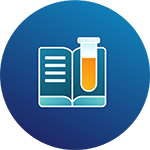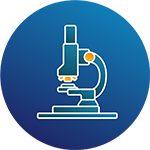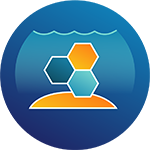
Marine Microbiology
The Smallest Inhabitants of the Ocean
Marine microbiology is the study of microorganisms that exist in saltwater environments, including the deep ocean, coastal waters, estuaries, marine surfaces, and seafloor sediments. Too small to be seen with the naked eye, these resilient microorganisms (or “microbes”) have evolved to survive in various conditions, including extremes of temperature, currents, light, pressure, and nutrients. Marine microbiology is one of the many specialized areas of microbiology, but for “ocean connection” purposes, certainly one of the most relevant.[1] And because microbes comprise almost ninety-eight percent of the ocean’s biomass, supply more than half the world’s oxygen, and are the major processors of the world’s greenhouse gases, marine microbiology is not just one of the most critical areas of microbiology, but all the marine sciences.[2]
Marine microbiologists study different aspects of these salt-water dwelling microscopic organisms, including interactions of microbes with other microbes, plants, and animals; biochemical cycling; geomicrobiology and processes on the seafloor; and their role in pollution, water quality; harmful algal blooms, and climate change. Given the vast amount of microbes in the ocean, a marine microbiologist must have familiarity with a wide range of marine and biological sciences such as biogeochemistry, oceanography, ecology, geology, chemistry, physiology, and genetics. A good grasp of engineering and the ability to fix sophisticated mechanical objects are two additional areas that are essential when you are a thousand miles from the nearest port and your remotely operated submarine springs a leak. Marine microbiologists will spend time in the lab and out on the high seas. With such a small percentage of existing microbes known, categorized, and examined, a career as a marine microbiologist provides you with an incredible potential for discovery and the opportunity to find solutions to climate change and manage and utilize the ocean as a sustainable resource.[3]
…
Citations
- Please see the “Microbiology” field of study for a description of the various areas of microbiology.
- Marine Microbes, Australian Institute of Marine Science.
- Marine Microbiology, Microbiology Society.

The Path to Becoming a Marine Microbiologist
From High School to Your First Job
Build a Solid Academic Foundation
Basics:
Take all available STEM-related courses (biology, physics, chemistry, algebra, geometry, calculus) offered at your school. Take these classes at the most advanced level possible. This will help you learn to think critically, problem-solve, and build your knowledge base in scientific theory and concepts.
Recommended:
If not available at your high school, try and take biology-related (microbiology, molecular biology, zoology, biochemistry, microbial ecology), ocean science-related (marine biology, oceanography, coastal oceanography, geological oceanography, physical oceanography), and climate science-related classes offered online.
Keep in Mind:
Try and get lab work experience through a research internship. Learn how to write for a scientific and non-scientific audience. The ability to communicate clearly in writing cannot be overstated. Given the international nature of scientific collaboration, become fluent in at least one foreign language.
Dive In!
And become an expert
![]()
Peruse our library of must-read books
![]()
Thumb through a scientific publication
![]()
Take an online course
![]()
Watch an interesting video
![]()
Check out these great websites
Get a

jump on your Academic career
There’s no substitute for experience.
We have compiled a database of thousands of internships, research opportunities, academic programs and specialized training programs so you can get a jump on your academic career.
Internships
Research
Academic Training Programs
And if you need support to fulfill your dreams and ambitions, our searchable database has plenty of scholarship opportunities as well as programs designed to increase diversity in the sciences.
Scholarships
Diversity, Equity & Inclusion
Need Help Finding Your Opportunity?
Our video tutorials explain the ins and outs of landing a great internship, research project or training program.
Make all the right moves
Advice from those who know
Maintain an excellent GPA, especially in the sciences
Secure an internship at a microbiology lab
Have some practical work experience on your resume
Get fieldwork experience to supplement lab and classroom learning
Attend marine microbiology and marine science seminars and conferences
Present your research at student research colloquiums
Build your knowledge as an undergraduate researcher
Join professional societies and organizations
Stay current by reading professional and scientific journals
Learn about current research projects
What degree is right for you?

Bachelor’s Degree
A bachelor’s degree is required for all entry-level jobs. You should obtain a degree in marine microbiology or microbiology with a concentration in oceanography or other marine science. Because marine microbiology is interdisciplinary, you can also supplement your studies with chemistry, ecology, and geology. Familiarity with lab techniques and the use of scientific instrumentation are essential.
Master’s Degree
A master’s degree is highly recommended as there are so few programs at the undergraduate level that this is where you will be able to first begin to specialize your studies in marine microbiology. It will also open up more employment opportunities with governmental agencies and private industry. In a master’s program, you will learn the theory and the practice of marine microbiology and have the opportunity to engage in ocean-based fieldwork.
Doctorate
A doctoral degree and, most likely, post-doctoral studies are required if you want to apply for research grants, receive permits, gain university support and open up university teaching positions. Senior-level positions in state and federal government agencies (environmental control and monitoring agencies) and executive-level jobs in the private sector (petroleum, pharmaceuticals, aquaculture, research companies, environmental control companies) may also require that you have a doctoral degree.
10 Schools With Excellent Marine Microbiology Programs
Want to see the full list of colleges and universities with degree offerings or relevant courses?
Aquatic Microbiology Option
Oregon State University
Marine Science/Microbiology and Immunology
University of Miami
Molecular and Cellular Biology Concentration
Harvard University
Microbiology
University of Hawaiʻi at Mānoa
Microbiology
University of California, San Diego
Microbiology and Cell Science
University of Florida
Microbiology
University of Georgia
Microbiology
University of South Florida
Microbiology
Clemson University
Biological Sciences – Microbiology Concentration
San José State University
![]()
Tip 1
Unfortunately, there are few undergraduate marine microbiology programs. Find a school that offers a graduate program and sit in on classes. Try and get a job as a research assistant for a marine microbiology professor.
![]()
Tip 2
Create your own marine microbiology program by majoring in microbiology and taking marine science courses like oceanography, marine biology, and ecology which will prepare you for graduate school or employment.
![]()
Tip 3
Schools and employers will look for practical experience, so try and secure an academic or employment internship. While challenging to find, signing on to an ocean research cruise will be a fantastic boost to your career.
Have familiarity with one or more of the following areas

Robotics

Laboratory testing techniques

Geophysical survey

Advanced computer software

Remotely Operated Vehicles

Use and maintenance of lab equipment

Use of light and electron microscopes

Marine field data collection and analysis

Marine Geographic Information Systems

Navigation
Typical Job Functions of a Marine Microbiologist
Here are some of the interesting things you could be doing.
Observing and identifying sea-based microorganisms using molecular techniques.
Tracking microorganisms in salt-water environments.
Operating and maintaining specialized laboratory equipment and instrumentation.
Piloting remotely operating vehicles in the deep sea.
Performing DNA extraction, cloning, and sequencing.
Working with specialist computer software to undertake studies and research.
Handling, storing, and disposing biochemicals and biohazardous materials.
Making media for the cultivation of marine microalgae.
Mentoring and supervising graduate and undergraduate researchers.
There’s an Ocean of Possibilities
As you can see, marine microbiology is an interesting and challenging career choice. But more importantly, as a marine microbiologist, you will be at the forefront of discovery and helping unlock the mysteries of the ocean. And, just perhaps, the solution to climate change.
Common employers include:
Federal Government Agencies
- U.S. Environmental Protection Agency
- National Oceanic and Atmospheric Administration
- National Science Foundation
- Bureau of Ocean Energy Management
State Government Agencies
- Environmental Protection
- Fish and Wildlife
- Public Health
Military
- U.S. Army
- U.S. Navy
- U.S. Air Force
- U.S. Coast Guard
- National Defense Research
Private Industry
- Aquariums
- Research Laboratories
- Pharmaceutical Companies
- Petroleum Companies
- Aquaculture Companies
- Environmental Control Companies
Non-Governmental Organizations
- Environmental Organizations
- Conservation Organizations
Academia
- Universities
- Research Institutions
Start your career search with our extensive list of employment websites.
